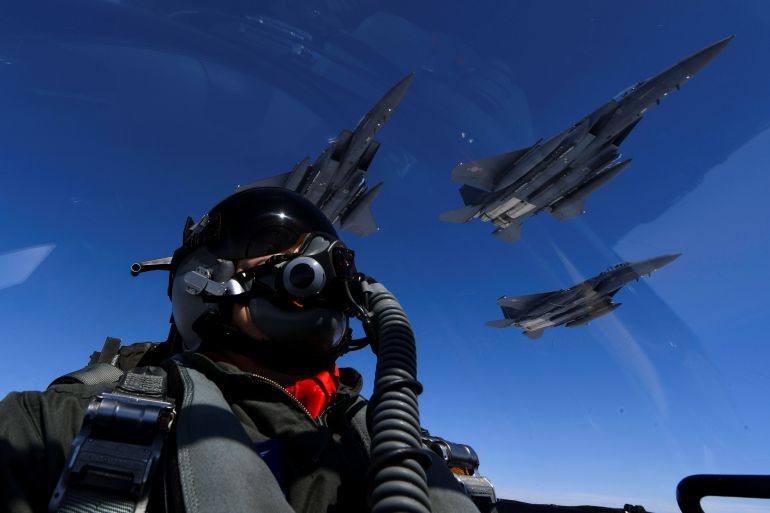S Korea, Japan scramble jets due to China-Russia joint air patrol
China’s defence ministry says joint patrol with Russian bomber aircraft was part of exercises that first started in 2019.

South Korea’s defence ministry has lodged a “stern” protest with Beijing and Moscow, local media reported, after Chinese and Russian military planes entered the country’s air defence identification zone unannounced during what China’s defence ministry said was a joint patrol exercise.
South Korean fighter jets were scrambled on Tuesday in response to the presence of four Chinese and four Russian military aircraft which did not violate the country’s airspace but did enter South Korea’s air defence identification zone (KADIZ).
Keep reading
list of 4 itemsChina scaling back spending in Southeast Asia, report says
Russia faces a new neighbourhood threat: China
UK orders China to close ‘secret police stations’ on British soil
Unlike a country’s airspace – the air above its territory and territorial waters – there are no international rules governing air defence zones.
South Korea’s Joint Chiefs of Staff said aircraft were expected to identify their presence when they enter the air defence zone “so as to prevent accidental clashes”, South Korea’s Yonhap News Agency reported on Tuesday.
“Our military identified the Chinese and Russian planes before their entry into the KADIZ and deployed Air Force fighters to conduct tactical steps in preparation against potential accidental situations,” Yonhap reported, citing a statement from the Joint Chiefs of Staff.
S. Korea expresses 'stern' protest to China, Russia over air defense zone incursion https://t.co/oIl0aM3pXn
— Yonhap News Agency (@YonhapNews) June 7, 2023
South Korea’s defence ministry said on Wednesday that it had lodged a protest with the Chinese and Russian embassies in Seoul and expressed regret their military aircraft had flown near “sensitive areas close to our air space”, Yonhap reported.
The ministry called on both countries to “take appropriate measures to prevent a recurrence, noting that such a flight could cause regional tensions”, Yonhap added.
Japan also said it scrambled fighter jets on Tuesday in response to a pair of Russian bomber planes that were joined by two Chinese bombers over the Sea of Japan and flew together as far as the East China Sea, where they were then joined by two Chinese fighter planes.
China’s defence ministry said the joint patrol was part of a cooperation plan between Beijing and Moscow and was the sixth such exercise since 2019.
Russian, Chinese Bombers Fly Joint Mission Near Japan, Korea as Russian Fleet Holds Major Drills in the Pacific – USNI Newshttps://t.co/flfzY4HnTa pic.twitter.com/ISdQvk7U6j
— U.S. Naval Institute (@NavalInstitute) June 6, 2023
South Korea also scrambled fighter jets in November 2022 during China’s last joint aerial patrol with Russia when Chinese H-6K bombers and Russian TU-95 bombers and SU-35 fighter jets entered the KADIZ.
During a joint patrol in May 2022, Chinese and Russian warplanes neared Japan’s airspace as Tokyo was hosting a Quad summit with the leaders of the United States, India and Australia. The air exercise alarmed Japan though China said the patrol was not intended to intimidate.
Beijing and Moscow’s joint patrols are part of expanding ties between the two in what has been called a “no-limits” partnership.
China’s growing military footprint in the Asia-Pacific also coincides with increased military manoeuvres and drills by the United States and its regional allies.
The White House has also recently warned of aggressive encounters between US and Chinese forces – ships and planes – in the Taiwan Strait and the South China Sea.
US Secretary of Defense Lloyd Austin told Asia’s top security summit – the Shangri-La Dialogue, which was held in Singapore over the weekend – that better communication was necessary between Beijing and Washington to avoid a crisis.
Lloyd said he was “deeply concerned” by China’s unwillingness to engage “on better mechanisms for crisis management” between their respective militaries.
“The more that we talk, the more that we can avoid the misunderstandings and miscalculations that could lead to crisis or conflict,” he said.
Austin also made specific mention of Chinese planes making “risky intercepts of US and allied aircraft flying lawfully in international airspace”.
“We won’t be deterred by dangerous operational behaviour at sea or in international airspace,” he said.
China defended its actions saying that Washington had provoked such encounters by conducting close reconnaissance of Chinese territory.